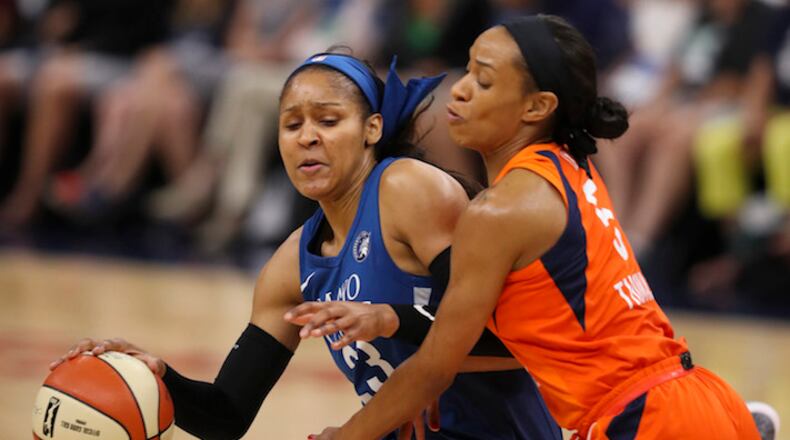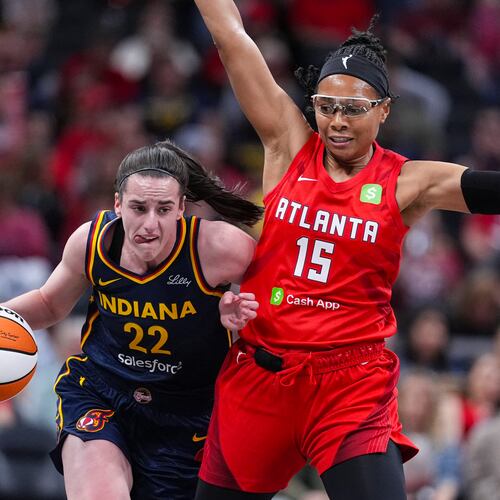It's the elephant in the room — the word no one wants to use. People often handle it with a childlike mind-set: "If I don't say it, it isn't real." It's hard to wrap your head around, the idea of your body turning against itself a shocking concept. It's "the C word," as Connecticut Sun guard Jasmine Thomas referred to it at one point.
Cancer.
And that unwillingness to talk about it is exactly what Jasmine is trying to change.
She counts herself lucky. The one brush she's had with cancer was in 2010, when her mom, Sharon, was diagnosed with stage 1 breast cancer. It was a painful, fearful time, but she knew her mom would be OK. Jasmine knows that it's not the same for everyone, though. She knows there are people who've seen the worst of cancer, the ability it has to debilitate and cause suffering. Above all else, she wants to prevent that.
"I didn't want to talk about it because I thought keeping it private would keep it safer, but now I understand how opposite that is," Jasmine said. "The more we talk about it, the more we desensitize it and make it something (where you know) you didn't just go through it, everyone's going through it. It's a community issue. It's something that we can (help) together through fundraising for research, but also just help in the knowledge of preventative care. The more that you can realize you can stay proactive and have your mammograms, you can put yourself in a better position."
Sharon Thomas told herself she had to stop crying. She needed to pull herself together and call her daughter, who was at Duke at the time, and tell her what she'd just learned. It was October, basketball season just getting into swing, and she wondered if she should hold off until she could make it to North Carolina and talk to Jasmine in person. When Sharon finally made the call, Jasmine was walking across the parking lot heading to practice.
"I told her it was stage 1 breast cancer and, of course, she got emotional," Sharon said. "She said 'What do I need to do? Do you want me to come home?' "
Sharon assured Jasmine that she didn't need to do that. They had a plan in place: She would undergo surgery to remove the mass and then complete roughly a year of radiation.
The feeling of finding out a parent has cancer is indescribable, no matter what stage, and Jasmine felt the immediate need for more information. She wanted to know about the disease that had somehow ended up in her mom, and the treatment she would have to go through. She wanted to know what could be done. She wanted to know her mom would be OK.
At the time, Jasmine was rooming with teammate Krystal Thomas, who lost her mom to breast cancer.
"Just being able to use her for my information, for my guidance, for my support, it meant everything to me," Jasmine said. "Just having her say, 'She's going to be fine.' (Hearing that from) someone who's experienced it and knowing that my mom was going to be fine almost resonated more with me than anything I could find online."
Though initially in shock and denial, Sharon put on a brave face for her children — parent before patient. She said she knew the importance of a positive attitude in the face of something so overwhelming. She did everything she could to face it head on while keeping those around her uplifted, often earning the praise, "You're an angel," from her nurses and fellow patients when she went to the hospital for radiation treatment.
The first time Jasmine drove Sharon to radiation, her mom was nervous. How would Jasmine handle this? The mix of hope and despair that often comes when in a room with people receiving chemotherapy and radiation is well-known to cancer patients, but less so to those who accompany them for the first time. But it was something that Jasmine wanted to do, and looking back, she said she's glad she did. Watching her mom interact with other patients, seeing her brave face slip ever so slightly, affected her.
"Most of the time, it was almost like she was normal, and when I would take her to treatment, that's when I could actually see how much it was taking a toll on her, how nervous she was about it," Jasmine said. "She was dealing with those emotions openly when she was at treatment. I feel like that's when I knew this is a strong, strong woman to be able to now have this in her medical history where she's going to have to be worried about it for the rest of her life and to be going through this and trying to keep it away from her kids."
Remission — the one word all cancer patients and their families long to hear. Sharon hit the five-year mark generally denoting remission in 2015, and Jasmine was with her, sharing in her joy and triumph.
Each year Sharon learns her mammogram is clear is a good year as she gets farther and farther away from her initial diagnosis. It doesn't stop the worry, though, as she enters the waiting room and sits in the same chair she did eight years ago when she learned she had cancer. It doesn't stop Jasmine's chest from tightening each year when she realizes it's mammogram time again. Cancer is irrevocably a part of their lives now.
If you ask Jasmine when she'll begin getting mammograms, she answers "35" without pausing to think. When she went to a mammogram with her mom, she waited until the doctor finished talking to Sharon before beginning to ask questions of her own. She wanted to know about preventative care and how to spot early signs. Her mom had been a stickler for checkups, but after one missed exam, she'd been diagnosed. Though they try to hold onto the joy of her recovery, fear has a way of slipping through the cracks occasionally.
That's why Jasmine and Sharon are so adamant about the women in their lives having breast exams and mammograms. The earlier it's caught, the better chance of beating it. Now, Jasmine knows all of her mom's mammogram appointments and reminds her about them, while Sharon in turn reminds all of her coworkers.
As a member of the Sun, Jasmine has a chance to encourage preventative care on a bigger platform. The team is holding a Breast Cancer Awareness game on Sunday, wearing commemorative uniforms that will be auctioned off to benefit Norma Pfriem Breast Center at Smilow Cancer Hospital.
"We used our scenario as a story of preventative care," Jasmine said. "Now that I'm older, I know plenty of women who haven't had the happiest stories dealing with breast cancer or any cancer, so for us to be able to say, 'If you stay on top of it, if you can remember to get your yearly physicals, remember to get your mammograms, you can catch it early. If it's going to happen, just catch it early.' We like to think that that's what came out of all this."
About the Author
Keep Reading
The Latest
Featured


